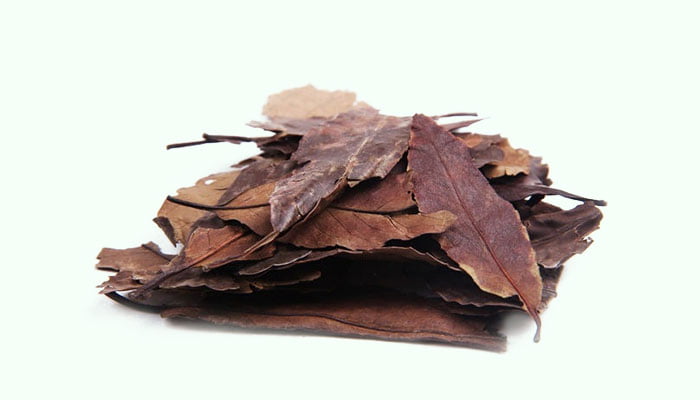What Is Si Ji Qing
Si Ji Qing also known as Dong Qing Ye or Folium Ilicis Chinensis is the leaf of Ilex chinensis, which is an evergreen tree belonging to the family Aquifoliaceae. It first appeared in <Ben Cao Shi Yi> (Supplements to Newly Revised Materia Medica) around 739 AD.
This plant is hardy and likes a warm climate. It often grows in evergreen broad-leaved forests or forest edges on hillsides 500-1,000 meters above sea level. It is widely distributed in tropical, subtropical, and temperate regions of the world.
It has high economic value and can be made into toys, sculptures, and farm tools. Its bark is rich in tannins, which can be made into tannin extract.

In the autumn and winter of each year, people gather the leaves of Ilex chinensis, remove their impurities, cut them into shreds, dry them in the sun, and make them into Chinese herbal medicines.
Si Ji Qing contains protocatechuic acid, protocatechuic aldehyde, chlorogenic acid, caffeic acid, gentisic acid, isovanillic acid, pedunculoside, rotundic acid, ursolic acid, sanguisorbin, quercetin, kaempferol, astragalin, apiolin, stigmasterol, β-sitosterol, daucosterol, glucose, tannins, and volatile oils.
According to <Ben Cao Tu Jing>, the medicinal nature of Si Ji Qing is relatively cold, with a bitter and astringent taste. It has a certain therapeutic effect on pathological changes of the lung and heart meridians.
In traditional Chinese medicine, it is used to clear heat and remove toxins, cool blood and stop bleeding, treat eczema, dermatitis, dysentery, biliary tract infection, urinary tract infection, angina pectoris, burns and scalds, traumatic hemorrhage, cough due to lung heat, thromboangiitis obliterans, skin mucosal ulcer.
Benefits
- Anti-inflammation, inhibiting xylene-induced ear swelling in mice.
- Increasing coronary blood flow, improving coronary circulation, and enhancing myocardial hypoxia tolerance.
- Lowering total cholesterol and triglycerides, increasing high-density lipoprotein.
- Promoting tissue regeneration, treating burns, scalds, lower limb ulcers, sores, and furuncles caused by heat toxins.
- Purging lung fire and treating cough and sore throat caused by the accumulation of lung fire or wind-heat.
- Treating difficult and painful urination, diarrhea caused by heat toxins.
- Cooling blood and stopping bleeding and treating traumatic bleeding.
- Inhibiting Staphylococcus aureus, Proteus, diplococcus pneumoniae, dysentery bacillus, Pseudomonas aeruginosa, Staphylococcus epidermidis, and Escherichia coli.
- Intravenous infusion of protocatechuic aldehyde can treat angina pectoris caused by coronary heart disease.
Combinations
- It can be used in combination with Zi Cao (Radix Arnebiae), Jin Yin Hua (Flos Lonicerae), Bing Pian (Borneol), etc. to treat burns.
- It can be used in combination with Shu Qu Cao (Pseudognaphalium Affine), Cang Er Zi (Fructus Xanthii), Huang Qi (Radix Astragali), Dang Shen (Radix Codonopsis), etc. to treat chronic tracheitis.
- It can be used in combination with Yu Xing Cao (Houttuynia Cordata), Jin Qiao Mai (Rhizoma Fagopyri Cymosi), Zi Wan (Radix Asteris), Ma Huang (Ephedra), Qian Hu (Radix Peucedani), Zhi Qiao (Fructus Aurantii), Gan Cao (Licorice Root), etc. to treat cough, fever, sore throat caused by wind-heat.
Side Effects
- Animal experiments showed that its decoction could cause certain liver injuries.
- Some patients taking it may cause nausea, vomiting, loss of appetite, or allergic reactions.
- Its injection may cause phlebitis or jaundice.
Precautions and Warnings
- The dosage of Si Ji Qing should be controlled at 15-30g.
- It can be made into decoctions, injection, or mashed for external use.
- People who are allergic to Si Ji Qing should not take it.
- Patients with deficiency-cold in the spleen and stomach should not take it.
- Patients with diarrhea due to intestinal looseness should not take it.
- Pregnant women and children should not take it.
